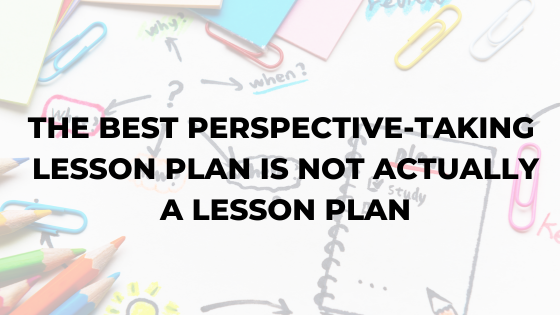Recently in some clinical discussion groups, I’ve seen therapists asking for lesson plans to build perspective taking and situational awareness.
This makes me feel optimistic, because it shows that they understand that social skills issues are related to executive functioning.
But “activities” for improving perspective taking will not come from a set of materials you can purchase from a publishing company.
They will come from experiences students are having in their lives.
Many people approach “lesson planning” for social skills intervention by searching for materials and mapping out what’s happening in upcoming sessions.
And sure, materials and lesson plans can be part of the process that facilitates the experience.
But it’s much more than that.
It should involve:
👉Conversations with other professionals and caregivers who see what’s happening in student’s day-to-day lives.
👉Strategizing/planning on your own or with others on the team to map out logistics of who’s responsible for what across the day.
👉Coaching/consulting others to share strategies for scaffolding in various environments.
👉Developing training materials (videos, handouts, documents) that support people with implementation so you can share information asynchronously.
👉Using therapy as an opportunity to prepare for upcoming events or reflect on past experiences.
👉Identifying relevant materials you need to support intervention (for direct therapy, training others, for use outside of therapy, etc.).
I know that the idea of a “print and go” curriculum sounds enticing. It makes things feel safe, controlled, and more predictable.
I also know that what I described above seems like I just threw more work on your plate.
But the methods I described have a compounding effect.
When you share your knowledge, you empower other professionals and caregivers to support students outside your sessions.
This will take work off your plate further down the line
And most importantly, it will make your direct intervention way more impactful.
What if you could feel confident about your sessions, without a complicated lesson plan?
What I described above is how you can make that happen.
I am a firm believer that related service providers should spend some time fine-tuning the skills they need to feel confident in how they handle direct intervention as I share in this post.
However, once you have a firm foundation in your clinical skills, you’re well-positioned to be an expert in on your multidisciplinary team.
Related service providers (e.g., social workers, school counselors, speech-language pathologists, OTs, psychologists) can emerge as leaders on their teams when it comes to implementing executive functioning support.
In order to effectively guide multidisciplinary teams, you have to think about leading change and having a long-term strategic plan for doing so.
With the right framework, it’s possible to make it happen even if you’re not in an official school administrator position.
This is an advanced skill, and you need a unique combination of clinical, leadership, and your own executive functioning skills to make it happen.
I show you how to do that in the School of Clinical Leadership, my program that gives related service providers a framework for putting executive functioning support in place on their school teams.
I created a free training to walk through the rationale behind the program, as well as a walk-through to help you better understand common mistakes school teams make when it comes to supporting executive functioning.
It’s called “How to be evidence-based and neurodiversity-affirming (by building executive functioning)”.
In this training, I’ll reveal:
✅Why kids continue to experience anxiety or behavioral challenges, even though they’re going to therapy or have a behavior plan.
✅Common mistakes multidisciplinary teams make when teaching executive functioning (and why lists, planners, and behavior charts aren’t working).
✅Why kids continue to struggle with problem-solving, and friendships, even though they’re going to therapy and social skills groups.

